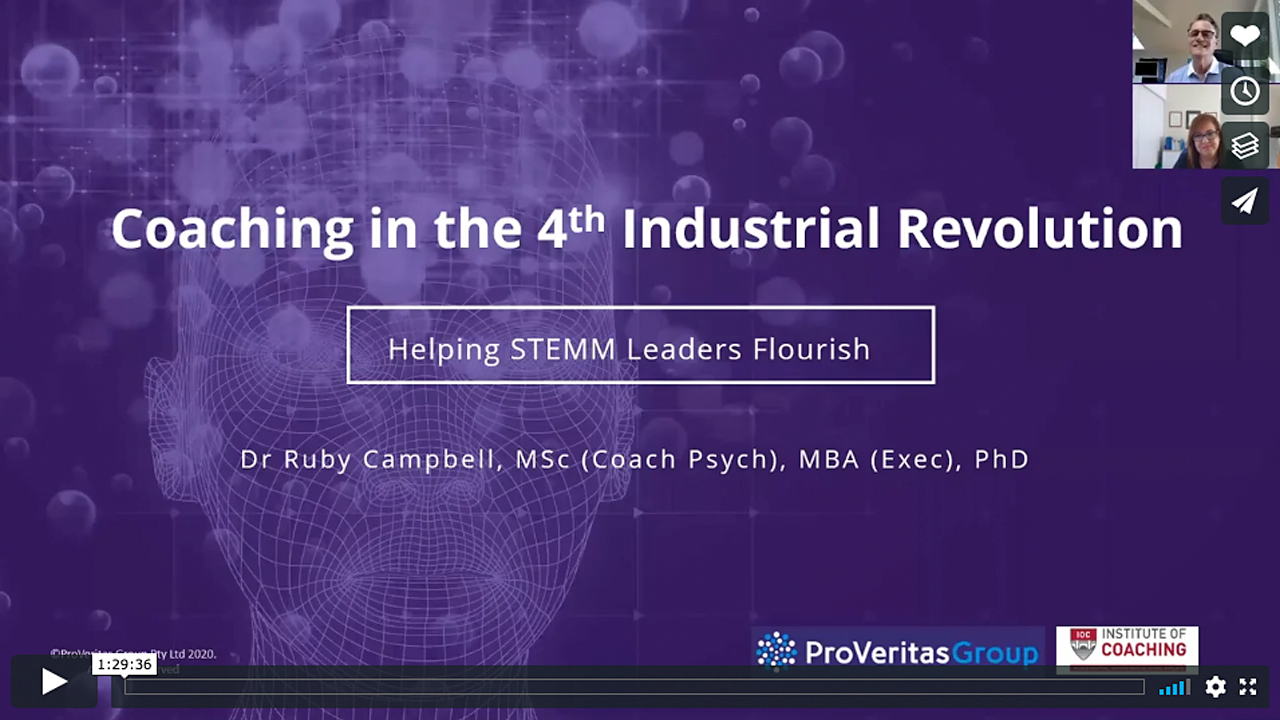Published: Apr 17, 2018
Written by: Dr Ruby Campbell

Over the past few years, we have witnessed colossal transformations in the workplace, which according to the 2018 Deloitte Global Human Capital Trends report, have been driven by technological, social, economic and political changes. A major outcome from such complex factors is people’s loss of trust in their political and social institutions, and the expectation that business leaders will fill the gap.
We live in a new reality and people are looking to “heroic leaders” who inspire at every level. And yet, original leadership research specific to the 21st Century remains thin, as observed by Barbara Kellerman, executive director of the Centre for Public Leadership at the Harvard Kennedy School.
Many of our clients at ProVeritas Group echo such concerns when seeking leadership coaching programs, wanting to learn how to win the minds and hearts of their teams. In this article, we present the 6 key learnings on character, synthesised from hundreds of coaching conversations with our leadership clients.

Photo of Nelson Mandela
In our leadership coaching programs, we ask our clients to think about a leader who has inspired them, and often they’ll mention Mahatma Ghandi, Martin Luther King Jr and Nelson Mandela. When asked what characteristic(s) make them special, the majority seem to sum it up with the word “character”.
Interestingly, there is no universally accepted definition for the word character. Some define it as the qualities valued by the individual, the qualities that make the person who he/she is, which may be viewed as a combination of his/her virtues, strengths and talents.
The Cambridge dictionary defines it as the combination of qualities, or positive traits, in a person that makes them different from others. The Merriam-Webster dictionary offers this definition: the complex (or sum of) of mental and ethical traits marking and often individualizing a person, group, or nation.
Prior to 2004, there was no common vocabulary for discussing measurable positive traits. Psychologists Martin Seligman and Christopher Peterson – pioneers in positive psychology - therefore set out to identify, organise and measure character by first defining it as traits possessed by an individual. These traits are stable over time but can still be impacted by setting (situation) and thus are subject to change.
Peterson and Seligman examined ancient and present cultures for information about how people in the past construed human virtue. Six core virtues emerged from their analysis, which they viewed as “core characteristics valued by moral philosophers and religious thinkers”:
They then moved down the hierarchy to identify character strengths, which are “the psychological processes or mechanisms that define virtues”. Twenty-four (24) strengths emerged, or values in action (VIA), which can be assessed using self-report questionnaires, behavioural observations, peer report methods and clinical interviews. The 24-character strengths can be viewed by clicking on the image below:
Positive psychologists have come a long way in terms of evidence-based models and it is no different with measuring the 24 Characters Strengths. Individuals can complete the test (now known as the VIA Survey) online and they will receive a report ranking the order of the participant’s strengths from 1-24, with the top 4-7 considered “signature strengths”.
Your signature strengths are those strengths that best describe the positive aspects of who you are. These strengths are strong capacities in you and they are probably engaging, energizing, and comfortable for you to use. Your family and friends would immediately agree these are important strengths that you have. Finding ways to use and express these strengths can provide benefits and help you flourish at work and in all other areas of life.
It is important to remember that everyone has the capacity to express and develop all the 24 strengths discussed in this report. In a nutshell, all strengths are important – they all matter – some are more relevant at certain times than others.
You can take the VIA Survey and receive a report by following this link: proveritascoaching.pro.viasurvey.org
It is hard to overstate the power of a company with leaders who inspire at every level of the organisation. These are the companies that deliver innovative and even heroic feats in business because so many of the people who work there are motivated to make them happen. Inspired employees are more engaged and are more than twice as productive as simply satisfied employees.
There is no consensus in the leadership literature about the specific qualities, or character strengths, needed to be an inspiring leader. According to recent research by Bain & Company and the Economist Intelligence Unit, 33 characteristics were identified for inspirational leadership (mostly a mix of leadership capabilities, and the 24 VIA Character Strengths). Moreover, the research suggested that leaders who possess 4 or more of these characteristics are the most inspirational.
The question is, which combination of characteristics or signature character strengths matter most? Can a leader with a certain combination of 4 to 7 VIA Signature Strengths be inspirational in every organisation, community or nation? As most experienced leaders already know, effective leadership isn’t generic - it depends on multiple factors.
Excellent performance can only be achieved when companies’ leadership profiles reflect their unique culture, strategy, business model and context. In a way, this becomes the company’s unique behavioural signature.
The same would be true for leaders – they need to possess the right combination of signature strengths for the organisational context in which they operate. For instance, a leader whose best talent is cost management will not inspire an organisation that creates value by out-marketing the competition.
Many leaders struggle to understand what is preventing them from flourishing in their leadership roles, which is one reason they may seek executive coaching. As we make progress through the coaching process, and the conversations shift towards the individual’s values and strengths, and what is truly important and meaningful, they uncover what truly motivates them.
At this stage, they often decide to realign their career and life goals with their values and signature strengths. On the other hand, the person may have the realisation that certain characteristics, or character strengths, need to be cultivated to achieve a life well lived, or happier living.
Either way, achieving congruence, or alignment, between the leader’s signature strengths and his/her career goals (which need to be aligned with the organisation’s goals) would be a precursor to becoming an inspiring leader. This realignment process can be quite nuanced due to the unique history, personality, life-stage and myriad other factors specific to the leader.
Now, here is the paradox about inspirational leaders: achieving personal signature strengths alignment with the organisation’s winning behavioural signature will not necessarily result in outstanding performance or in transformational change. Research (and history) suggests that “spikey”, not well-rounded leaders are the ones who create outstanding value for organisations.
In other words: the leader needs to behave differently if they want their teams to do so. And it all begins with developing greater self-awareness to cultivate character.
As with many terms originating from the world of psychology, self-awareness has become an important concept in leadership development programs, for obvious reasons. The clearer we see ourselves, the more confident and creative we become.
We also make better decisions, build better relationships and communicate more effectively. We therefore become better employees, achieve more promotions and become effective leaders of high-performing organisations.
Developing self-awareness is a long and exiting journey of self-discovery where leaders know who they are, what they want to accomplish, and seek out and value other’s opinions, as recently discussed by organisational psychologist Tasha Eurich in Harvard Business Review.
This is where leaders begin to fully realise the true benefit of self-awareness and how their character influences their teams, which has been the focus of leadership coaching psychology and positive organisational theory and practice over the past 10 years.
Leadership development theory and practice need to evolve to prepare more effective, inspirational leaders capable to navigate the stormy waters of the 21st Century. The extant research (including ours), and history, point to the importance of the leader’s character and the alignment with the organisation’s winning signature behaviours.
We therefore offer the 6 Key Learnings About Character to leaders who may curious about building their character:
1. Character makes you unique
2. Character has a vocabulary
3. Character can be measured
4. Character is crucial to leadership
5. The leader’s character inspires the organisation to change
6. Cultivating character is part of the self-awareness journey
As we like to share with our clients:
“If your actions inspire others to dream more, learn more, do more and become more, you are a leader.”
– John Quincy Adams
Check out this video from the VIA Institute about the Science of Character:
OUR KEY leadership coaching solutions
Emotional Intelligence, visioning, sense-making, inventing and other essential leadership capabilities.
Evidence-based, customised L&D solutions to equip 21st Century leaders achieve business outcomes sustainably.
Helping teams function as more than “the sum of its parts” by learning how to connect and collaborate effectively.
Helping organisations understand, develop and action evidence-based ESG strategies with humanity in mind.
Executive Leadership Media & Podcasts

Podcast: Ruby Campbell’s SCIENCE Coaching Model - Episode 20
LISTEN NOW HERE

Webinar: Dr Ruby Campbell with the IOC McClean Hospital/Harvard Medical School Affiliate on 'Coaching in the 4th Industrial Revolution'. Leadership Coaching has become one of the most effective Learning &...
VIEW VIDEO HERE

Podcast: In this episode from The Oxford Review Podcast, an interview from Dr Ruby Campbell, author of Scientists in Every Boardroom: Harnessing the power of STEMM leaders in an irrational...
LISTEN NOW HERE
Dr Ruby Campbell is the founder and Managing Director of ProVeritas Leadership, and Executive Coaching and Consulting firm. She is also the author of the ground-breaking book Scientists in Every Boardroom: Harnessing the Power of STEMM Leaders in an Irrational World.
MORE ABOUT OUR TEAM
Please complete the enquiry form so we can help you with your growth journey. You will receive an email from us within 24 hours.